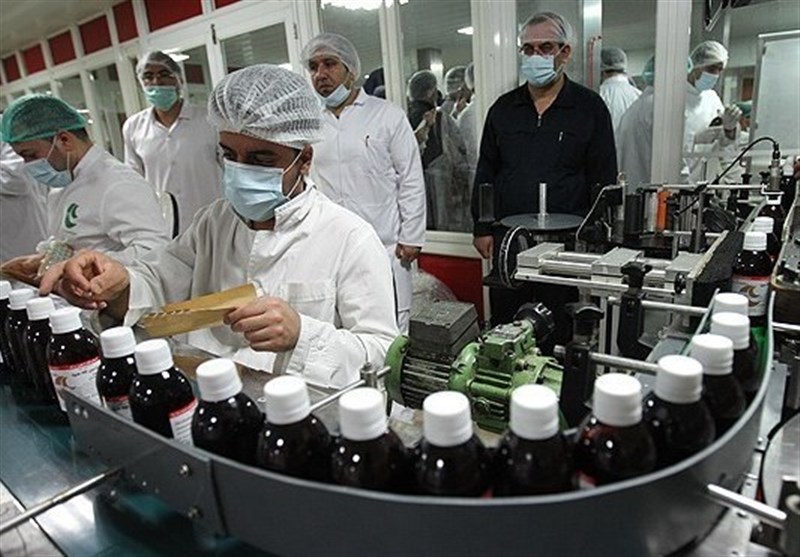
Behind the Pill: Addressing Mental Health Challenges on Pharmaceutical Frontlines
Barekat Pharmaceutical and Health Group: The pharmaceutical industry, as one of the foundational pillars of public health, plays an undeniable role in providing essential medications for disease treatment and improving quality of life. Among the key contributors to this sector are the production line workers—often unseen—who serve as the backbone of the industry. They are responsible for transforming raw materials into high-quality, safe pharmaceutical products.
These workers operate under intense workloads, strict production regulations, and physically demanding environmental conditions—all of which significantly impact their mental health. Mental well-being among production workers not only influences their individual welfare but directly affects the quality of the final products and consumer safety. Unfortunately, in many pharmaceutical plants, the psychological health of this group is overlooked, and their mental challenges remain largely unaddressed.
This report aims to conduct a comprehensive analysis of the mental health status of production line personnel, identify influencing factors, and propose practical, evidence-based solutions for improvement. This study draws upon industrial psychology, human resources management, and occupational health to offer scientifically grounded recommendations to address this pressing issue.
Critical Role of Production Line Workers in the Pharmaceutical Sector
Key Responsibilities
Production line workers are tasked with the precise and continuous execution of drug manufacturing processes, requiring high levels of accuracy and concentration. Their responsibilities include setting up and adjusting equipment, adhering to strict GMP protocols, conducting quality control checks across production stages, and ensuring proper packaging and labeling of pharmaceutical products. Precise documentation of all stages and timely reporting of any deviations or defects are integral to their duties.
Given the high sensitivity of pharmaceutical production, even minor errors can have serious implications for patient safety. Workers must also comply with safety protocols and engage in ongoing cooperation with various factory departments. Continuous training to update skills and maintain awareness of environmental risks is essential. These demanding and complex tasks impose considerable psychological pressure, requiring organizational support and sound mental health management. Without the dedication and effort of these individuals, the production of high-quality medicine would be impossible.
Work Environment Characteristics
The working environment for production staff in pharmaceutical factories is distinct and complex, differing significantly from standard workplaces. These settings are typically enclosed, isolated, and equipped with high-efficiency ventilation systems to prevent microbial and chemical contamination. Employees must wear full protective gear—including masks, gloves, and head coverings—which restricts movement and leads to physical fatigue. The lighting is often artificial, with minimal or no natural light, contributing to lower morale and energy levels. Constant noise from industrial machinery further adds to psychological stress.
Workers follow rotating shifts, including night shifts, which disrupt circadian rhythms, impair sleep quality, and negatively affect mental health. Limited social interaction and repetitive tasks reduce motivation and increase feelings of isolation. These factors make the production environment particularly challenging and call for tailored mental health support.
Consequences of Neglecting Mental Health
Ignoring the mental well-being of production line workers can have far-reaching consequences at the individual, organizational, and societal levels. Chronic stress and psychological strain reduce concentration, increase human error, and compromise product quality. Mental disorders such as anxiety, depression, and burnout can emerge, threatening both mental and physical health.
These issues often lead to frequent absenteeism, diminished job commitment, and higher turnover rates—bringing significant operational and financial burdens to the organization. Low morale and reduced productivity further hinder overall performance.
Ultimately, compromised drug quality can erode consumer trust and endanger public health. Therefore, prioritizing the mental health of production staff should be a core element of HR strategies and occupational health policies to prevent these negative outcomes.
Key Factors Affecting Mental Health
Workload & Long Hours
Production workers frequently endure intense workloads and long shifts—one of the main threats to mental health. Performing repetitive tasks over extended periods results in mental fatigue and reduced motivation. Irregular shifts, such as overnight work and holiday duties, disrupt natural body rhythms, adversely affecting sleep and recovery.
Poor work-life balance decreases life satisfaction and increases stress, potentially leading to chronic stress symptoms, anxiety, and burnout. Harsh working conditions lower psychological resilience and heighten sensitivity to workplace stressors. Organizations that fail to address these issues face lower productivity and rising psychological distress among employees. Thus, managing workload and optimizing work schedules is crucial.
Human Relations & Management Interaction
Interpersonal relationships and the quality of communication between staff and supervisors are vital to maintaining mental well-being. Ineffective communication, lack of managerial support, and punitive leadership styles foster insecurity, anxiety, and stress. A workplace lacking teamwork and collegial interaction leads to psychological isolation and reduced work motivation.
Poor conflict management and lack of safe spaces for expressing concerns intensify psychological pressure. Organizational cultures that emphasize control over support pose significant risks to employee mental health. Additionally, the absence of positive feedback and recognition can diminish workers’ sense of value and motivation.
Improving interpersonal dynamics and equipping managers with communication skills are effective strategies for reducing stress and boosting job satisfaction. A supportive and collaborative work environment plays a key role in mental health enhancement.
Compensation & Benefits
The level of compensation and benefits for production workers significantly influences their mental well-being. Inadequate wages—especially considering the demanding nature of the job—foster dissatisfaction and feelings of undervaluation. Lack of supplementary insurance and psychological support services leaves employees more vulnerable to mental health issues.
Moreover, the absence of both financial and non-financial incentives—such as recognition or promotion opportunities—leads to demotivation and reduced organizational commitment. Insecure employment conditions and short-term contracts generate chronic anxiety and job instability, further harming mental health.
Revising pay structures, providing mental health insurance, and offering supportive benefits can make a substantial difference. In short, workplace fairness and job satisfaction are crucial in mitigating psychological stress.
Job Insecurity
Temporary contracts and lack of job guarantees contribute significantly to job insecurity among production workers. This instability increases stress levels and diminishes motivation to actively participate in organizational improvements.
Prolonged insecurity may lead to psychological disorders such as chronic anxiety and depression. Fear of termination often discourages workers from voicing their concerns, further intensifying stress. Organizational policies that fail to ensure job security will inevitably damage the mental well-being of their workforce.
Establishing long-term employment frameworks and offering emotional support can reduce job insecurity and improve employee mental health.
Lack of Organizational Mental Health Programs
One of the most critical barriers to improved mental health is the absence of structured and coherent mental health programs in the workplace. Without access to industrial psychologists or professional social workers, employees are left to face their mental challenges alone. Additionally, the lack of regular training in stress management and interpersonal skills increases psychological vulnerability.
Organizations that ignore mental health as part of their strategic planning face increased absenteeism, reduced productivity, and higher workplace accident rates. Establishing industrial psychology units, offering counseling, and conducting regular training sessions are among the most effective steps to enhance mental health. Teaching stress management techniques and fostering a supportive work environment can boost job satisfaction and mitigate mental health problems. Thus, organizational mental health initiatives are not optional—they are essential.
Common Signs of Psychological Distress in Production Workers
Due to high job and environmental pressures, production line workers may exhibit various signs of psychological disorders. Recognizing these symptoms early is crucial for prevention and intervention:
-
Burnout: Characterized by chronic fatigue, low energy, lack of motivation, and disengagement. Workers may become indifferent to responsibilities and experience decreased performance.
-
Work-related anxiety: Persistent worry about making mistakes, fear of job loss, and work-related stress reduce focus and increase error rates.
-
Hidden depression: Symptoms include disinterest in daily activities, poor concentration, feelings of worthlessness, and mental fatigue—often unnoticed by others.
-
Aggressive behavior: Irritability and aggressive reactions toward colleagues or supervisors may signal unmanaged stress and negatively impact workplace dynamics.
-
Physical symptoms: Frequent headaches, muscle pain, sleep disturbances, and digestive issues often accompany mental health problems and jeopardize overall well-being.
Early detection and appropriate response can prevent more severe outcomes and preserve employee mental health.
Practical Recommendations for Mental Health Improvement
Education & Awareness
-
Conduct regular training sessions on stress management, time management, and shift optimization.
-
Offer workshops for mid-level managers and supervisors on supportive leadership and team-building principles.
-
Publish internal newsletters with practical psychological tips for employees and their families.
-
Provide short audio-visual guides on improving sleep, mental relaxation, and recreational activities.
Organizational & Structural Interventions
-
Establish in-house mental health units staffed with industrial psychologists or social workers.
-
Create direct feedback channels for employees to communicate with senior management.
-
Allocate regular short breaks during shifts and provide quiet rest areas.
-
Launch participatory programs to foster teamwork and social bonding.
Improving Environmental & Physical Conditions
-
Enhance lighting with daylight-simulating LEDs.
-
Reduce noise pollution through sound-dampening technologies.
-
Optimize air ventilation to minimize heat and discomfort.
-
Develop green or nature-themed rest areas to uplift mood and reduce mental fatigue.
Enhancing Compensation & Benefits
-
Review wage systems to ensure fair pay and motivation.
-
Offer supplementary health and mental insurance.
-
Provide non-monetary incentives such as appreciation awards, loyalty points, or cultural and recreational benefits.
-
Define clear career progression paths to encourage employee growth.
Ensuring Job Security & Organizational Support
-
Offer long-term contracts to instill job stability.
-
Hold meetings to clarify organizational goals and address employee concerns.
-
Include supportive clauses in contracts for mental health emergencies.
-
Develop long-term partnerships with unions or trade associations to strengthen social support.
Government & Regulatory Bodies
-
Develop and enact legislation on industrial mental health for pharmaceutical factories.
-
Require the presence of industrial psychologists in HR structures.
-
Oversee regular mental health inspections through relevant health and labor bodies.
-
Provide financial support or subsidies to factories implementing sustained mental health programs.
-
Establish centralized data centers to collect and analyze mental health metrics in critical industries.
-
Foster research networks with universities to produce locally adapted knowledge.
-
Create national standards and guidelines for mental health care in industrial settings.
Conclusion
Production line workers in pharmaceutical plants play a vital role in safeguarding public health but are frequently exposed to psychological strain and demanding work conditions. Neglecting their mental health can result in reduced product quality, increased errors, and threats to patient safety.
However, through well-structured educational, organizational, environmental, and legal initiatives, the mental well-being of these workers can be significantly improved. Achieving this requires the unified collaboration of management, government, and professional bodies.
These unsung heroes of public health deserve the best working conditions, psychological support, and job security.
-
Afghanistan’s Ministry of Public Health Delegation Meets Barkat Pharmaceutical Group Executives

-
Voice of Life in World of News — Redefining Health Journalism in the Information Age

-
Senior Health Officials & Barkat GD Visit Sobhan Oncology

-
Barkat Group specialized meeting

-
Safa Appointed as Barekat General Director

-
Barekat Health & Pharmaceutical Group at the 10th Iran Pharma Exhibition

-
Ali Safa visits Sobhan Oncology & Sobhan Darou

-
Pirsalehi & Safa visit Saman Daroo 8 Knowledge-based Company

